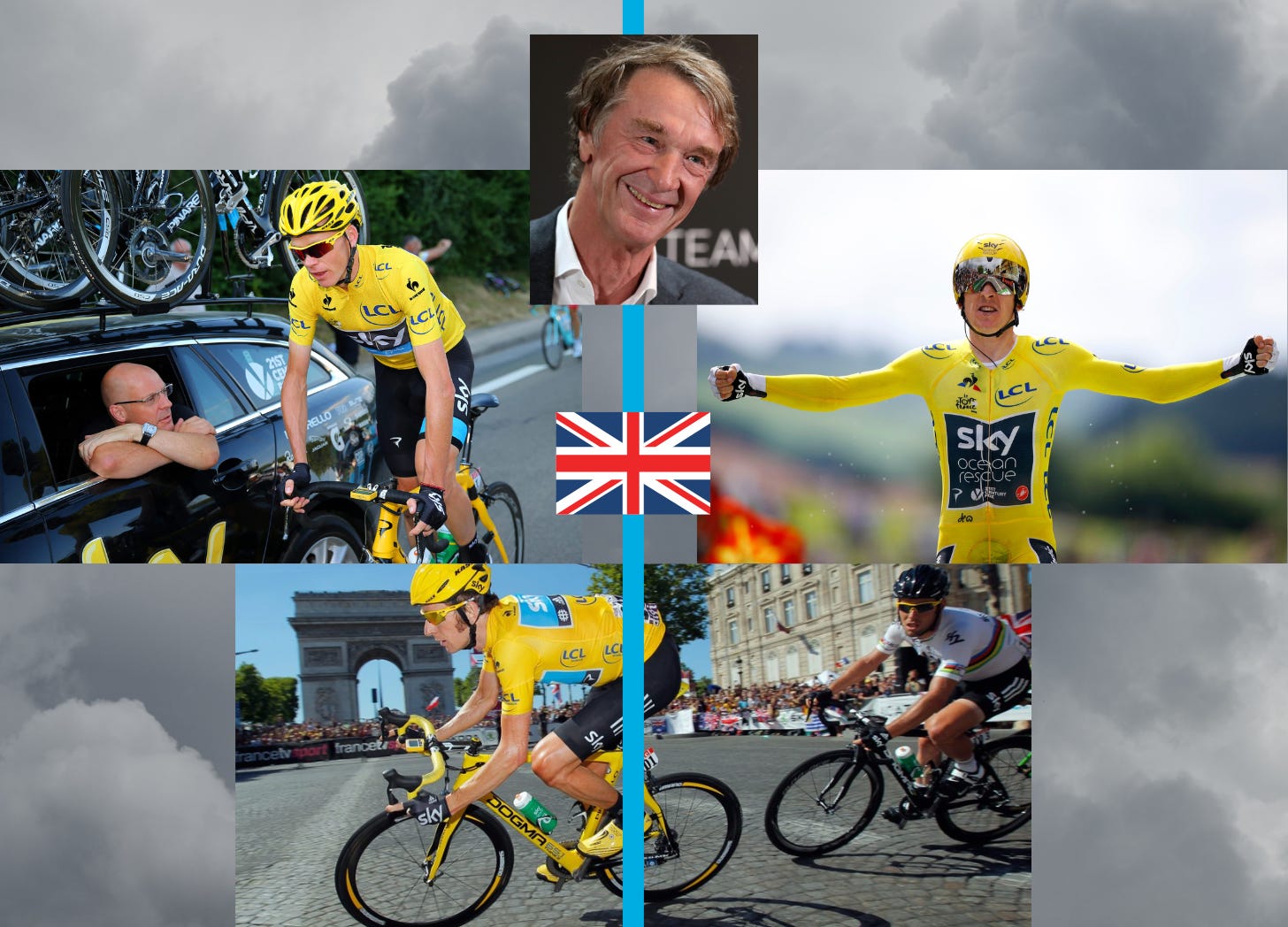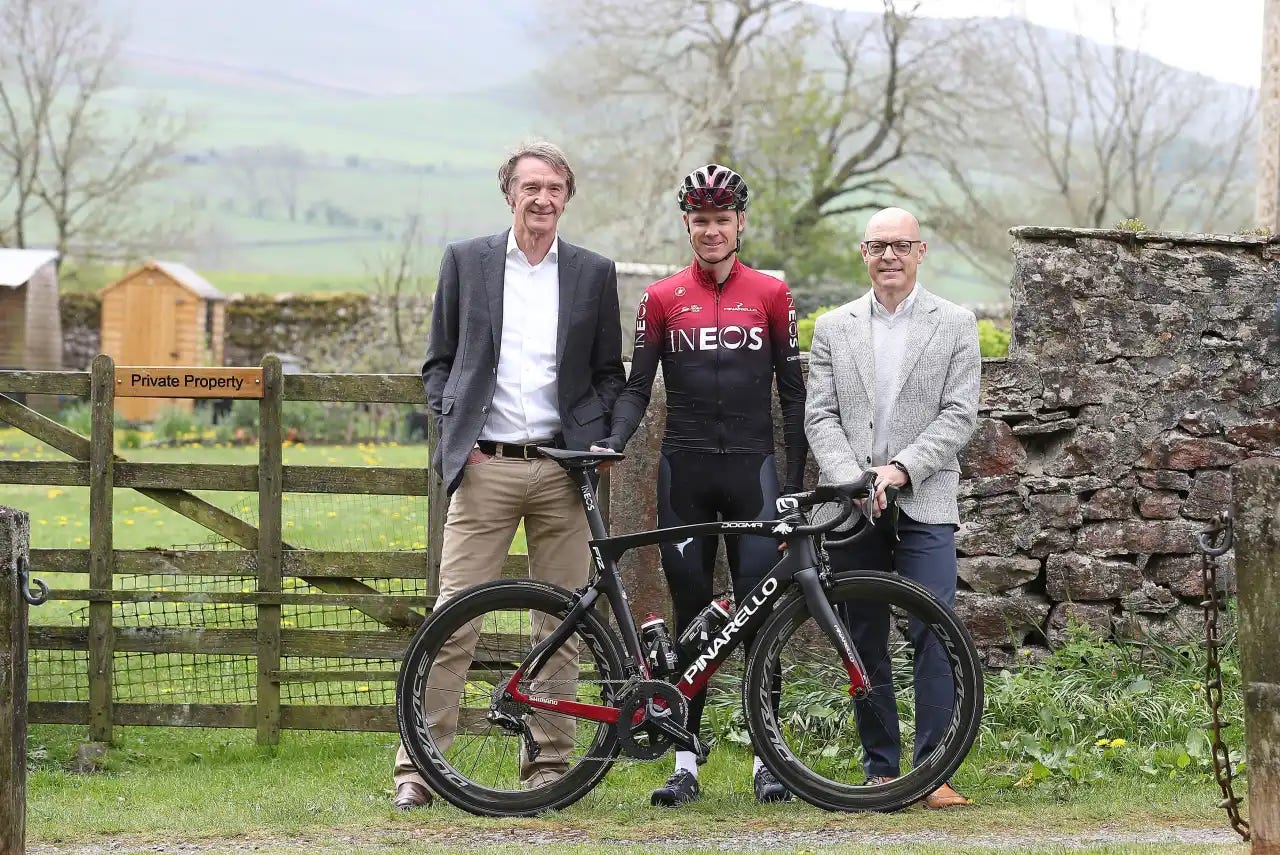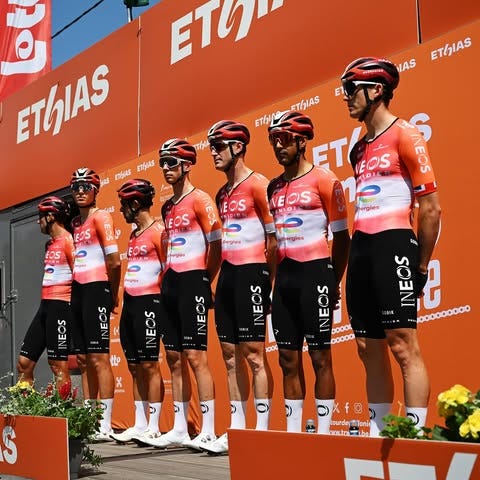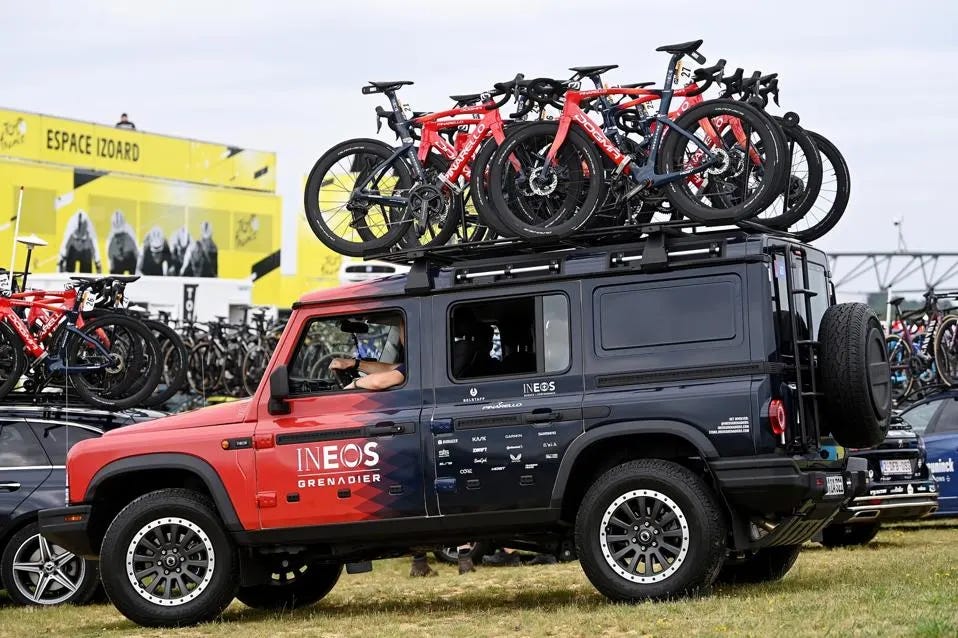Sky to Ineos: The unravelling of Britain’s superteam
How Ineos squandered its dominance, its culture, and Britain’s brightest talent.
The team that redefined cycling is now unrecognisable. Remember when Team Sky felt untouchable? When anything other than total Grand Tour domination felt like failure? They were the disruptors: altitude training before it was cool, pillow protocol, kitchen trucks and aerodynamics. While other teams laughed, Team Sky won everything.
Then in 2019 came the divorce. At the height of their success, Sky split away, and Ineos stepped in. It was a happy divorce, and they finished first and second at the Tour de France that year. The new era promised a billionaire backer and all of the resources they could hope for.
Yet, instead of becoming something new, they doubled down on what they knew. They turned revolution into routine.
Fast forward to 2025 and the Ineos Grenadiers are a shadow of their former self. They're stuck in an identity crisis: part British legacy project, part Grand Tour dinosaur, and a total absence of culture.
Culture? What culture?
When a team loses its culture, it loses its identity.
The edge that once made Sky untouchable: the obsession, the attention to detail, dare I say the British-ness, is now unrecognisable. It’s a lazy comparison, given they’re both owned by the same billionaire, but the Ineos Grenadiers are the Manchester United of cycling.
Look at the names that they’ve lost recently: Pidcock. Hayter. Bigham. Tulett.
Tom Pidcock is a once-in-a-generation talent who was allowed to walk out mid-contract. Officially, it was ‘amicable,’ but anyone who’s been around the sport has heard otherwise.
Dan Bigham? The aero genius that every detail-driven team dreams of moved away last season. He was quoted last year in The Telegraph saying:
“I feel that a lot of performance we’re leaving on the table and that frustrates me because it’s clear as day we should be doing things a lot better.”
And Ethan Hayter? A rider with the raw talent to be one of the best of his generation, was left feeling disillusioned enough to say:
“If you run a cycling team like a company, the riders and staff lose their passion. That was the case with Ineos in recent years. Racing felt more and more like a job.”
It’s not just the riders; leadership hasn’t helped. Dave Brailsford, the architect of their dominance, stepped back to focus on Ineos’ wider sporting empire. Rod Ellingworth walked out. Steve Cummings stepped up, and then was forced out. They lost Luke Rowe upon his retirement too.
While it’s hardly relevant, symbolic how they went from Rapha and Castelli, to now Gobik, a downgrade that mirrors their slide in prestige. The kit design at this year’s Tour de France summed it all up: it screamed that the team had stopped caring about details.
It’s worth noting that it’s not just British talent that has left Ineos in recent years. Jhonatan Narváez looks like a new man at UAE, and Luke Plapp broke his contract with the team to join Jayco-AlUla.
What could’ve been
It was the summer of 2019 when I first heard rumours of an Ineos Grenadiers U23 team. Devo squads were few and far between back then, especially those owned by World Tour teams. Jumbo-Visma were just in the process of hiring for their U23 Academy, which started in 2020.
There was smoke, but no fire. The rumours turned out to be just rumours, and no team materialised.
And yet, the blueprint was right there. The GB Academy had produced names like Thomas and Cavendish, who ruled in the Sky era. The system worked. All Ineos had to do was copy it, turbocharge it with their budget, and they would have cornered British talent for a generation.
But nothing came. No academy. No development squad. Just a gaping hole where the future should have been. This wasn’t a question of money. It wasn’t a question of knowledge. So what was it?
Daniel Benson recently reported that Ineos will finally launch a U23 team in 2026. Frankly, it feels too little, too late. In the years they sat still, the sport changed. Britain’s best prospects were hoovered up elsewhere.
By the time Ineos finally joins the party, its reputational damage is so high that young talent will almost certainly look elsewhere.
Was this the seed of their downfall?
The modern peloton is awash with British-born talent. Hayter. Pidcock. Onley. Wright. Poole. Pickering. Gloag. Askey. Vernon. Hell, even Ben Healy. Add these names to the British talent that Ineos have managed to keep hold of: Swift. Tarling. Watson. Turner. You could have one hell of a squad.
A core that could’ve carried the team into a new era, blending Grand Tour pedigree with the explosive new style that defines modern cycling and arguably built a classics powerhouse.
Instead, those riders are scattered across the WorldTour, snapped up by teams with better pipelines and a vision for the future. In standing still, Ineos handed Britain’s next generation away.
With a budget that sits in the upper echelons of the World Tour, their hiring in the last five years has been so poor it’s borderline comical. They’re making decisions that not even a mid-table team would be proud of.
They seemed to look everywhere but the development pond that had treated them so well. While every other major team discovered hidden gems, Ineos seemed to buy lottery tickets.
Scandal
There’s an underlying question mark on the Sky era, which is tarnishing the Ineos Grenadiers. Team Sky were built on an anti-doping promise, and Brailsford’s outspoken zero-tolerance stance has been well documented. Now it seems to look like a stick to beat him with.
There are far too many unanswered scandals that hang over the team: the jiffy bag, Dr Freeman, salbutamol, and now David Rozman.
This year’s Tour de France marked Brailsford’s return to the team. His return coincided with the questions around David Rozman - Ineos’ head soigneur who is somewhat intertwined with the Doctor in the Operation Aderlass doping ring.
Brailsford refused to talk to journalists about the case, only replying “fucking hell, guys, come on.”, to a gaggle of journalists, when asked.
Each of these unanswered questions chips away at the team’s credibility, leaving Ineos feeling less like the sport’s squeaky clean innovators and more like relics of a tainted era.
Chaos killed control
Professional cycling has embraced mayhem in the post-COVID era.
Pogacar wins Flanders in April, then dominates the Tour in July. Van der Poel turns Monuments into epics. And Evenepoel attacks from 60km out because, why not?
Sky built their empire on control, but, the revolutionaries of 2012 have become the establishment they themselves once buried. The new kings thrive on pure chaos.
"You either die a hero, or live long enough to see yourself become the villain."
Harvey Dent, Batman The Dark Night
I was going to finish there, but the more I write this, the more it becomes clear that there has been a systematic failure at the Ineos Grenadiers. It’s staggering how quickly they’ve gone from the team that everyone in world sport looked to for innovation, to one that now feels anonymous.
They let generational talents walk away. They hired poorly. They missed obvious signings. Their culture crumbled away.
For me, and for thousands of Brits who grew up in the Sky era, this stings harder than it should. Team Sky were the reason I fell in love with cycling. Without the Sky train, without Wiggins in yellow or Cav in rainbows, I wouldn’t be living this life.
The Spanish have Movistar, the French have FDJ or Decathlon, the Aussie’s Jayco and so on. Ineos lost its British identity and with it, their culture and purpose. Maybe, just maybe, that’s the root of their problem.
There’s a cruel, almost poetic irony to it all. They changed the sport forever, and then quietly became the thing they once rebelled against.
—
If you’re interested in reading more about the Ineos situation, these are cracking pieces of work:
Skyfall: The inside story of Ineos Grenadiers’ collapse - Escape Collective
An Anatomy Of The Doping Story That Has The Tour de France Press Room Buzzing - Defector
While you’re here…
I’ve added a paid subscription and a ‘Buy Me A Coffee’ link to this post. As the year progresses, I’m planning on building this blog and putting out articles which I’ve always wanted to write but, for whatever reason, haven’t wanted to pitch. Your contributions allow me to do that.
https://www.buymeacoffee.com/joelaverick
The following brands are racing partners of mine which allow me to do cool stuff.






I help run a small amateur team in Texas and we plant our flag on our culture. It's immovable and we will not change it for anyone. To be honest it's immune to budget and everything else. It's simply all about the people/riders. Thanks for writing.
Nice call out of Defector's TDF coverage — alongside EC's. Both sites had a good team in the ground this year.